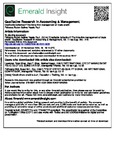Creditable behaviour? The intra-firm management of trade credit
| dc.contributor.author | Boden, R | |
| dc.contributor.author | Yassia Paul, S | |
| dc.date.accessioned | 2018-04-23T15:50:43Z | |
| dc.date.available | 2018-04-23T15:50:43Z | |
| dc.date.issued | 2014-09-23 | |
| dc.identifier.issn | 1176-6093 | |
| dc.identifier.uri | http://hdl.handle.net/10026.1/11328 | |
| dc.description.abstract |
<jats:sec> <jats:title content-type="abstract-heading">Purpose</jats:title> <jats:p> – This paper aims to explore the reasons for the apparent failure of many UK firms to achieve the competitive advantages indicated in largely positivist literature through the management of their trade credit positions. </jats:p> </jats:sec> <jats:sec> <jats:title content-type="abstract-heading">Design/methodology/approach</jats:title> <jats:p> – The paper utilises data from a set of semi-structured interviews with trade credit managers in firms and is the first substantial qualitative study of the intra-firm aspects of trade credit management in the UK. Through this approach, we explore the reasons why the theoretical promise of trade credit may or may not be realised. </jats:p> </jats:sec> <jats:sec> <jats:title content-type="abstract-heading">Findings</jats:title> <jats:p> – The principal findings relate to the importance of three organisational attributes (skills/awareness, communication and structural position of the activity in the firm). That is, trade credit management should be regarded as a relational activity and not merely a narrow technical function. The paper finds that there is no generic formulation of these attributes that can deliver on the promise of trade credit identified in the extant literature. Rather, individual firms must adapt themselves to suit their circumstances. </jats:p> </jats:sec> <jats:sec> <jats:title content-type="abstract-heading">Practical implications</jats:title> <jats:p> – This paper will be of interest to and is relevant for companies, accounting professionals and policymakers. Trade credit represents a significant area of commercial risk, and the problems experienced with its effective management have previously proved somewhat intractable. </jats:p> </jats:sec> <jats:sec> <jats:title content-type="abstract-heading">Originality/value</jats:title> <jats:p> – This paper reports on the first substantial piece of UK work to look at the actualities of how trade credit is managed within firms and what the implications of this are.</jats:p> </jats:sec> | |
| dc.format.extent | 260-275 | |
| dc.language | en | |
| dc.language.iso | en | |
| dc.publisher | Emerald | |
| dc.title | Creditable behaviour? The intra-firm management of trade credit | |
| dc.type | journal-article | |
| dc.type | Journal Article | |
| plymouth.issue | 3 | |
| plymouth.volume | 11 | |
| plymouth.publication-status | Published | |
| plymouth.journal | Qualitative Research in Accounting & Management | |
| dc.identifier.doi | 10.1108/qram-08-2012-0032 | |
| plymouth.organisational-group | /Plymouth | |
| plymouth.organisational-group | /Plymouth/Faculty of Arts, Humanities and Business | |
| plymouth.organisational-group | /Plymouth/Faculty of Arts, Humanities and Business/Plymouth Business School | |
| plymouth.organisational-group | /Plymouth/REF 2021 Researchers by UoA | |
| plymouth.organisational-group | /Plymouth/REF 2021 Researchers by UoA/UoA17 Business and Management Studies | |
| plymouth.organisational-group | /Plymouth/Users by role | |
| plymouth.organisational-group | /Plymouth/Users by role/Academics | |
| dc.rights.embargoperiod | Not known | |
| rioxxterms.versionofrecord | 10.1108/qram-08-2012-0032 | |
| rioxxterms.licenseref.uri | http://www.rioxx.net/licenses/all-rights-reserved | |
| rioxxterms.type | Journal Article/Review |


